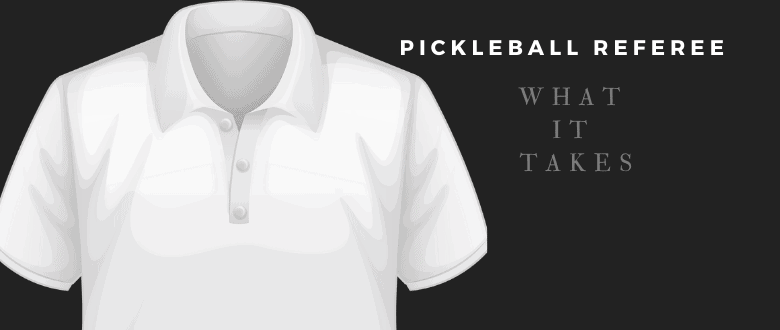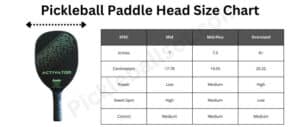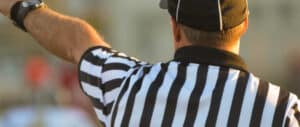Pickleball referees play an important role in game progression by enforcing rules that govern the sport. Line judges are expected to call games fairly and independently which can be tough during quick match play. However, the results are rewarding due to the fairness created by properly enforcing the rules.
If you’ve ever thought about becoming a pickleball referee, the guide below outlines the steps you will need to take to become a certified pickleball line judge. Interest in becoming more than just a causal player, but more of scholar that understands the complete inner workings of the game and the rules that govern it is a satisfying accomplishment for most seeking to become line judges.
![]() Related – Need a NEW Pickleball Paddle? See the TOP picks here!
Related – Need a NEW Pickleball Paddle? See the TOP picks here!

Types of pickleball referees
Referees in pickleball consist of 4 levels ranging from beginner to advanced. Below is the progression that each pickleball line judge takes:
Newcomer referee
The beginning level of becoming a pickleball referee starts with the newcomer. This level is for people that don’t know a lot about the rules, but have a passion to learn. Newcomers will need to become a USAPA member, watch the referee quick start guides, become familiar with the Official Rulebook, take an online player test, and sign up for an in class referee training course. Newcomers have a general understanding of pickleball but lack the expertise to apply it consistently.
Level 1 referee
The level 1 referee has completed all the training required of newcomers and shows proficiency in officiating sanctioned tournament matches. Level 1 referees should continue to study the rule book, know how to understand and fill out scoresheets, practice refereeing both tournaments and practice events, complete the referee test, line judge test, and player test, meet with a certified referee to evaluate your skills, and adhere to the Tiered Referee Rating form for level 1 referees.
Level 2 referee
Advancing to level 2 requires in depth knowledge of all aspects of the game and how to handle on-court situations that typically arise. Level 2 referees have complete understanding of the rule book and can officiate medal matches. Level 2 referees will continue to study the rule book while applying the referee’s casebook, work with outside trainers to clean up any issues in officiating techniques, meet with certified trainers to stay up to date and critique one another, and pass the Level 2 tiered referee training form.
Certified Referee
The highest level of pickleball referee is to become a certified referee. This level of referee can officiate all pickleball games, from practice to tournament play for professionals. Certified pickleball referees should continue to officiate games regularly to stay sharp, complete advanced pickleball training sessions, become certified by a referee coordinator, pass the referee test, line judge test, and visual acuity test, and pay an evaluation fee. To earn the “white shirt” that certified referees where takes time and dedication.
The following are the steps and resources it takes to officiate pickleball games.
Here’s a great video explaining how to become a pickleball referee
Learn the reference material
Becoming a pickleball referee is centered around studying the rule book. Reference material is readily available for those that have the passion to be come a referee. The first place to start is by obtaining a copy of the 2022 official rulebook and study it.
Pickleball rules are changes or modified yearly, so continued analysis of these modifications is paramount for a yearly refresher. Below are the first steps for reference material learning:
- Get the latest Official Pickleball Rulebook
- Look for the latest rule change document
- Obtain the latest officiating handbook
- Read the equipment standards manual
- Study the approved paddle and pickleball lists
- Print out score sheets and become familiar with them
- Read over the referee’s casebook
Training is key
Knowledge is often best retained through course materials presented in an organized fashion. Pickleball referee training material is available in both video and printable formats. Local training classes may be available by certified referees as well.
Referee training materials to look for:
- On demand referee training videos
- Referee training PowerPoints
- Line Judge self-training documents
- Free online referee training classes (where available)
The programs and policies of pickleball matter
To become an official referee or line judge, several compliance documents must be filled out and presented. These include certificates of insurance, agreement to the compliance policies for referees, and liability coverage insurance.
Additionally, the mentor roles and responsibilities for Certified Referee Coordinators at level 2 should be reviewed and practiced fully. Referee and line judge programs are available for those showing proficient degree of awareness to becoming a line judge. Visual acuity forms require 20/30 or better vision (uncorrected or corrected) when tested with both eyes open and in use.
Apply to be a registered trainer
Those wishing to become a referee trainer can apply with the applicable referee training forms. A basic understanding of the tiered referee system is needed for progression. Advanced training courses are available through regional certified coordinators where on-court skills and knowledge can be demonstrated.
The referee applicants are scored using the Tiered Referee Rating and ATS Form (TRR/ATS form). The TRR form scores the referee applicant on 35 different levels including score calling skills and knowledge base. Level 1 or 2 certifications are then awarded if the desired skill level is met. Line Judge Rating Forms score those that wish to become certified line judges.
![]() Related – Need a NEW Pickleball Paddle? See the TOP picks here!
Related – Need a NEW Pickleball Paddle? See the TOP picks here!
What does it mean to be a certified pickleball referee?
Certified referees must meet the Referee & Line Judge Program requirements. This includes being 16 years of age or older and have taken official pickleball training through a qualified instructor.
A certification application is then submitted and reviewed for completeness. Certification renewals process and applications are conducted when certifications expire.
Reach out to current certified referees
Search tools are available for contacting certified referees to coordinate training courses. The organizational charts of current RTCs and CRCs is available online.
Pickleball Referee Testing
Three pickleball referee tests are available to test your pickleball knowledge. Test range from 40-50 questions and are available for Line Judges, Players, and Referees. These online tests are a good way to see if you possess the knowledge to become a more advanced member of the game.





